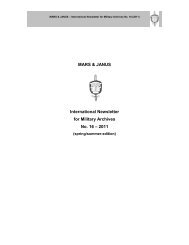National Experiences - British Commission for Military History
National Experiences - British Commission for Military History
National Experiences - British Commission for Military History
You also want an ePaper? Increase the reach of your titles
YUMPU automatically turns print PDFs into web optimized ePapers that Google loves.
tH e pl a C e o f do u H e t: a reassessment 107<br />
Italian (specifically Caproni) inspired, no historian has cared to examine the possibility<br />
that the <strong>British</strong> concept of strategic bombardment was - if not Italian inspired<br />
- than Italian influenced. Indeed, the scale of the Italian bombing campaign (which<br />
was very considerable, dwarfing the <strong>British</strong> and German campaigns) is almost totally<br />
unappreciated in Britain today - despite the fact that the Italian strategic bombing<br />
campaign was the first in history.<br />
At the end of July 1915, Douhet had proposed the creation of a <strong>for</strong>ce of 500<br />
Caproni bombers to mount a sustained strategic bombing campaign against Austrian<br />
communications, ports and industries. And, although Douhet’s proposal was officially<br />
turned down (despite Caproni’s enthusiastic support), within three weeks the<br />
Italians had embarked on just such a campaign - albeit in a limited fashion initially.<br />
The campaign reached its height in the late summer of 1917, with repeated and devastating<br />
attacks by large numbers of Capronis on the Adriatic port of Pola, HQ of the<br />
Austrian Navy.<br />
Italian aviation, and in particular the Italian strategic bombing campaign, were<br />
given extensive and admiring coverage in the US and <strong>British</strong> newspapers and aviation<br />
journals of the day - the bombing campaign right from its inception. During<br />
the war, all the major Italian achievements in the air were fully reported and widely<br />
discussed in Britain e.g. Laureati’s epic non-stop flight from Turin to London, the<br />
daring attack on Cattaro, D’Annunzio’s audacious daylight flight over Vienna and,<br />
of course, the massed raids on Pola.<br />
During the war, the Rome correspondents of the “Times” (William McClure),<br />
the “Daily Mail” (G. Ward Price) and the “Morning Post” (William Miller) all wrote<br />
many interesting and in<strong>for</strong>mative articles about Italian aviation, and especially its<br />
long-range bombing operations e.g. McClure’s article “Italian progress in the air”<br />
(Sept. 1917). McClure (who also had the distinction of being Chief Correspondent<br />
with the Italian armies during the war) was closely connected with Italian aviation<br />
circles, and had been ever since he had accompanied the Italian <strong>for</strong>ces during the<br />
fighting in Libya. After he left the “Times” in 1920, McClure joined the <strong>British</strong><br />
Embassy in Rome as Press Officer, and remained there until his death in 1939. Is it<br />
conceivable that McClure was not aware of Douhet’s writings? And if he was aware,<br />
is it likely that he would have kept such knowledge to himself? His fellow correspondent<br />
William Miller was a close friend and adviser of Hoare during the latter’s<br />
wartime service in Italy.<br />
It is now hard to appreciate that, during WWI, Italian aviation was widely regarded,<br />
in Britain and the US especially, as leading the world - principally because<br />
of its strategic bombing campaign. FW Lanchester (a leading and influential <strong>British</strong><br />
airpower theorist), looking back on the Italian’s spectacular long-range bombing<br />
successes of summer 1917, wrote in the magazine “Flying”: “The Italian Air Service<br />
was very much to the front on the question of bombing, and had been advertised<br />
the world over by the exploits of the big Caproni machine. There were many who<br />
believed that the Italians were really ahead on the strength of this”.



